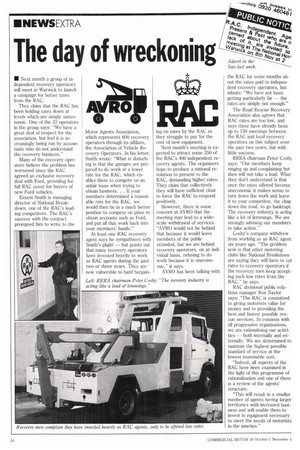The day of wreckonin
Page 26

If you've noticed an error in this article please click here to report it so we can fix it.
• Next month a group of independent recovery operators will meet in Warwick to launch a campaign for better rates from the RAC.
They claim that the RAC has been holding rates down at levels which are simply uneconomic. One of the 22 operators in the group says: "We have a great deal of respect for the association, but feel it is increasingly being run by accountants who do not understand the recovery business."
Many of the recovery operators believe the problem has worsened since the RAC agreed an exclusive recovery deal with Ford, providing for full RAC cover for buyers of new Ford vehicles.
Ernest Smith is managing director of National Breakdown, one of the RAC's leading competitors. The RAC's success with the contract prompted him to write to the
Motor Agents Association, which represents 600 recovery operators through its affiliate, the Association of Vehicle Recovery Operators. In his letter, Smith wrote: "What is disturbing is that the garages are prepared to do work at a lower rate for the RAC, which enables them to compete on an unfair basis when trying to obtain business. . . If your members determined a reasonable rate for the RAC, we would then be in a much better position to compete on price to obtain accounts such as Ford, and put all that work back into your members' hands."
At least one RAC recovery agent says he sympathises with Smith's plight — but points out that many recovery operators have invested heavily to work as RAC agents during the past two or three years. They are now vulnerable to hard bargain ing on rates by the RAC as they struggle to pay for the cost of new equipment.
Next month's meeting is expected to attract some 350 of the RAC's 400 independent recovery agents. The organisers hope to produce a national resolution to present to the RAC, demanding higher rates. They claim that collectively they will have sufficient clout to force the RAC to respond positively_
However, there is some concern at AVRO that the meeting may lead to a widescale withdrawal of services. "AVRO would not be behind that because it would leave members of the public stranded, but we are behind recovery operators, on an individual basis, refusing to do work because it is uneconomic," it says.
AVRO has been talking with the RAC for some months about the rates paid to independent recovery operators, but admits: "We have not been getting particularly far — the rates are simply not enough."
The Road Rescue Recovery Association also agrees that RAC rates are too low, and says there have already been up to 150 meetings between the RAC and local recovery operators on this subject over the past two years, but with little success.
RRRA chairman Peter Cosh) says: "Our members keep ringing up and complaining but then will not take a lead. What they don't understand is that once the rates offered become uneconomic it makes sense to turn down the work and leave it to your competitor, the chap down the road, to go bankrupt. The recovery industry is acting like a lot of lemmings. We are strongly advising our members to take action."
Cosby's company withdrew from working as an RAC agent six years ago. "The problem now is that other motoring clubs like National Breakdown are saying they will have to cui rates to recovery operators if the recovery men keep accepting such low rates from the RAC," he says.
RAC divisional public relations manager Ron Naylor says: "The RAC is committed to giving motorists value for money and to providing the best and fastest possible rescue services. In common with all progressive organisations, we are rationalising our activities — both internally and externally. We are determined to maintain the highest possible standard of service at the lowest reasonable cost.
'Indeed, all aspects of the RAC have been examined in the light of this programme of rationalisation and one of them is a review of the agents' structure.
"This will result in a smaller number of agents having larger territories with increased business and will enable them to invest in equipment necessary to meet the needs of motorists in the nineties."






























































































































